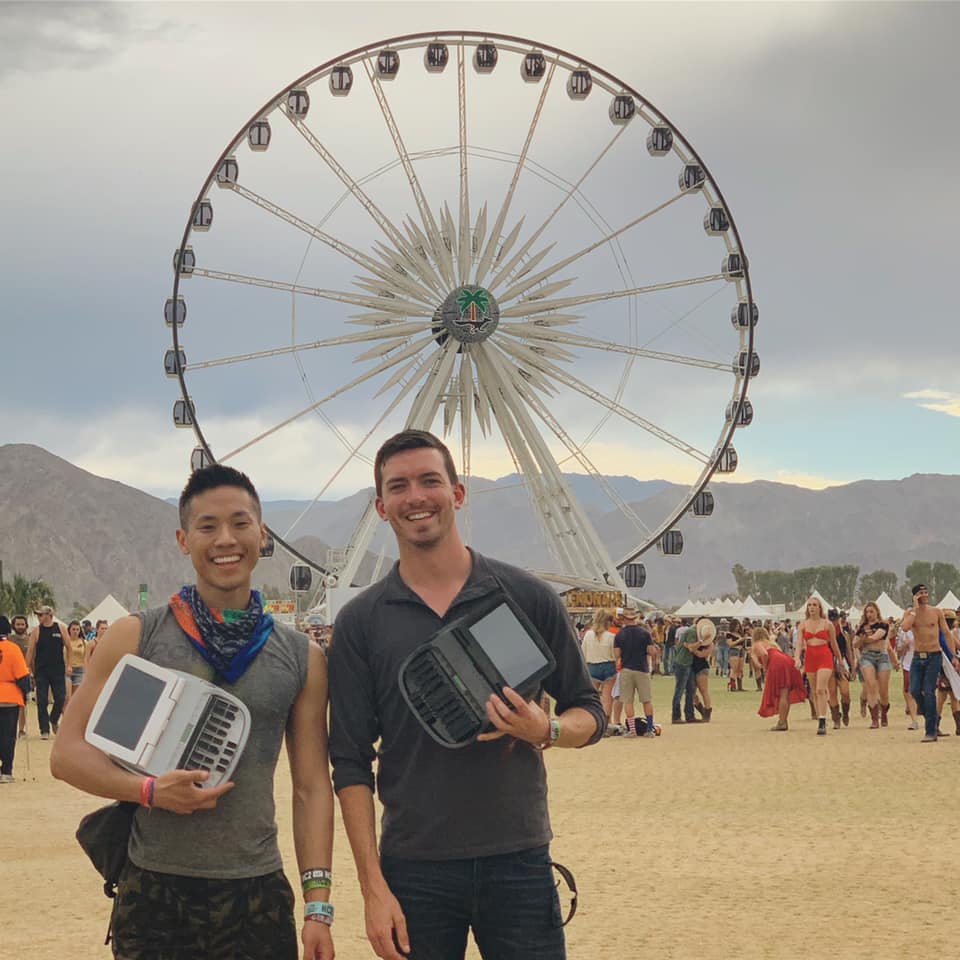
By Heidi Renner
When Isaiah Roberts, RPR, Magnolia, Ill., thought he wrote the word lemon while captioning Ariana Grande’s performance at Coachella, he was a little concerned. Did she really say lemon? It turns out he was captioning the moment when someone in the crowd threw a lemon and hit Grande, which became a well-known moment at the music festival.
“I remembered writing lemon during Ariana’s performance and definitely thinking I misheard something,” he posted on Facebook. “Then my cab driver in LA today asked if I saw her get hit by the lemon, and instantly I felt a relief knowing why I did, in fact, write lemon followed by a bunch of expletives.”
Roberts and Stan Sakai, CRC, New York, N.Y., had the unique experience of captioning Coachella, an annual music festival in Indio, Calif. It is one of the biggest music festivals in the world. Then the next weekend they captioned Stagecoach, another music festival held in the same location. Roberts posted a video from Coachella that has been widely shared.
Roberts had looked at the ADA section of Coachella’s website and noticed it told people to reach out if they needed ASL or closed captioning. He sent an email asking if they offered captioning and who provided it? Coachella responded on a Monday saying they wanted to have a meeting to talk about it on Friday. Roberts called his friend Sakai, and they prepared for the meeting. Sakai had already built a website that allowed captioning to be accessed through an app. Sakai worked on making changes to his program to make it work with Coachella. Roberts said the two worked late into the night every night that week. They gave a demonstration Friday to the Coachella representatives over a video call.
“They were blown away,” Roberts said. The representatives recorded what they were seeing on the screen and then showed it to the festival directors. “We were on cloud nine,” Roberts said.
Sakai described it this way on Facebook: “After hundreds of hours of work, the Coachella and Stagecoach captioning systems are online and (nearly) ready to go! A five-server monstrosity spread across New York and California able to serve at peak 29,000 connections per minute, averaging 2,000 connections served per minute at saturation. This will be woven into their existing web and mobile platforms available to their 130,000 attendees, who will all be able to access the live captioning of mainstage performances right from their phones. As a team, Isaiah and I will be tag-teaming, between feeding out pre-scripted lyrics and live stenoing, handing off the baton depending on what’s thrown at us. And when people ask if technology will replace us, my answer to that is: no, we harness technology to keep us going!”
Because the captions were available through the festival app, they were available to everyone. All audience members were required to download the app to activate their wrist bands.
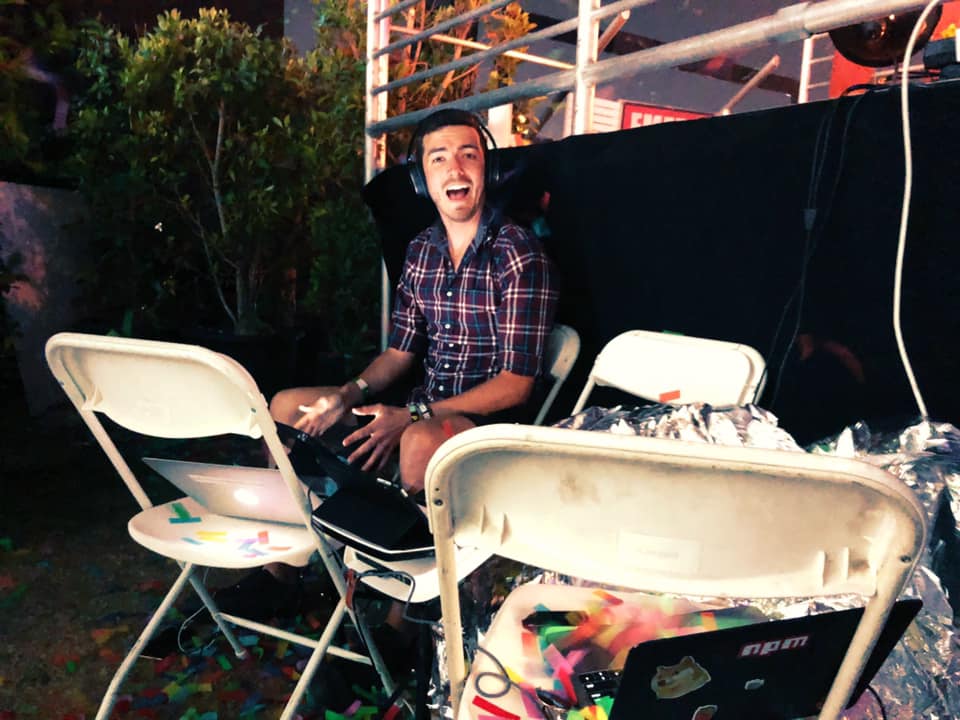
Roberts saw it as an opportunity to spread the word about court reporting and captioning.
“This is the thing I’m most excited about,” he said. “In trying to grow the profession, I speak to students, but does it really make the profession look appealing? Being at the major music festival really meant something.”
Rachel Meireis from Placentia, Calif., appreciated the captions. She had requested captioning at Stagecoach.
“I am late deafened,” Meireis said. “I lost my hearing in my 20s and wear bilateral cochlear implants to help me hear. But it can be iffy and makes it quite hard to know what’s going on at times. That situation gets complicated because I can sign but I am not fluent in ASL at all. Having access at the concert was amazing. I could keep up with what the performer said between songs and understand lyrics I have been hearing wrong on the radio. Having the captions stream to my phone was great too. It made me able to leave the ADA riser freely and move about the concert but still follow along. Stanley and Isaiah were so helpful and friendly though the whole process. I am very grateful they were able to make this work.”
Roberts said he had wondered who would be benefiting, and he was happy to meet Meireis. During Coachella there were 500 unique visitors viewing the captions. At Stagecoach, there were 400 on the first day. By the end of the weekend they had reached about 1,000 people.
“Hands down the best part was meeting Rachel and getting to meet a consumer of [the captioning],” Roberts said.
For the actual captioning, Roberts and Sakai would usually get a set list so they would look up lyrics ahead of time when possible. They had headphones directly hooked to the singer’s microphone. Sometimes the performer would start talking about other performers or the other people on stage with them, so Roberts and Sakai tried to prepare ahead of time for those things as much as they could. They worked together, captioning on both of their machines at the same time. Sometimes one person would write and the other would look up lyrics.
“It was as cool as I wanted it to be,” Roberts said. “I don’t know what could have gone better.”
Roberts urges other court reporters and captioners to make more of these opportunities happen. Coachella didn’t offer captioning until Roberts reached out to them.
“My takeaway is whatever event you are into, realize that under the ADA they need to offer this service,” Roberts said. “Advocate for yourself.”
Sakai and Roberts are hoping this is a beginning, and there will be more music festival work for them.
Sakai summarized the experience on Facebook: “COACHELLA RECAP: Between shoddy internet connections, knocked-over equipment from dudes getting tackled backstage, my laptop getting nailed by a flying rogue water bottle, or minor software issues, providing live captioning at Coachella was a resounding SUCCESS. Isaiah and I powered through and got the app online on all the monitors at the ADA platforms and on the official Coachella mobile app, captioned Spanish-language performers, and even spared a few moments to visit our friends. I’m still gobsmacked and star-struck by the weekend but can’t help to think that this is the beginning of something huge. We all worked hard but we’re both forever grateful for having had the opportunity to pioneer live-event captioning on this scale. A HUGE thank you to Isaiah for making this all possible, and as I’ve said before, I remain humbled and excited for what’s to come.”
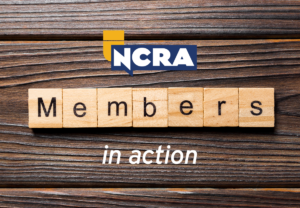


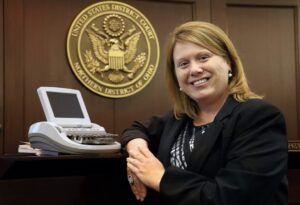
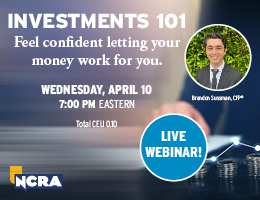

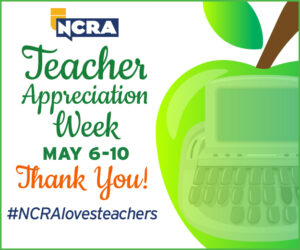
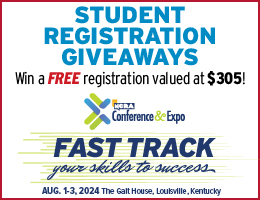
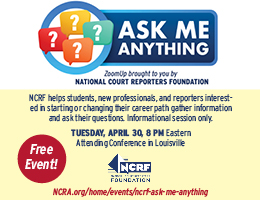
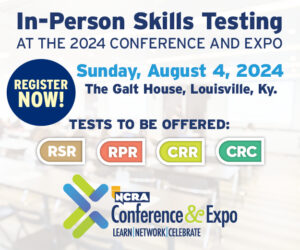
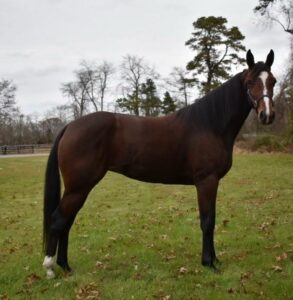
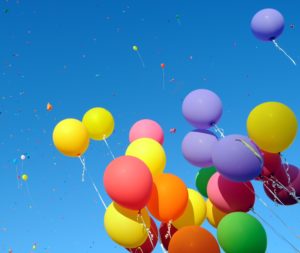
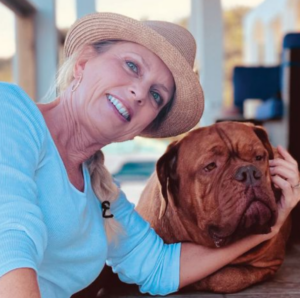
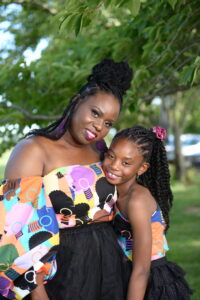


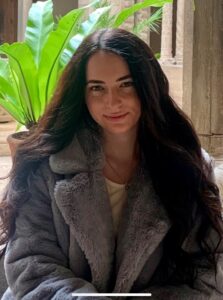
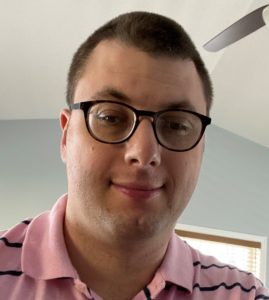
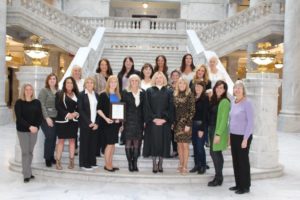
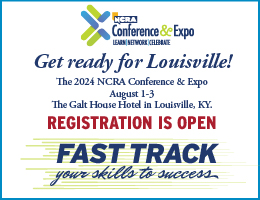
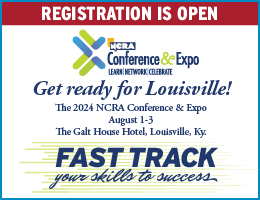



[…] published May 14, 2019, on TheJCR.com, a publication of the National Court Reporters Association and reprinted here with […]
[…] House of Representatives and U.S. Senate, and for closed captioning of live and televised events, such as the Coachella music festival in California or major league baseball, football or basketball […]
[…] program director, Roberts is quite popular with younger reporters and even did live captioning at Coachella this past summer. He will speak to the students and answer their questions about life on the […]
[…] Roberts, two court reporters who brought new technology for providing captions at Coachella 2019. Read the article in the Journal of Court […]